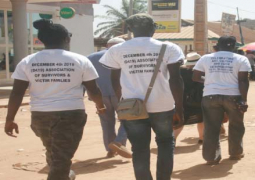According to the Trade Integration Report for 2014, prepared by the West African Monetary Institute (WAMI) - the body facilitating the technicalities of the regional integration process of the West African Monetary Zone -“The draft report shows that intra-ECOWAS trade is about 10.0 per cent and intra-WAMZ trade is even lower at about 1.0 per cent and both have declined in 2014, compared with 2013.”
It also outlines factors responsible for this condition, saying they include the outbreak of the Ebola Viral Disease in the region, infrastructure deficiencies, non-tariff barriers to trade, and other issues.
“The limited implementation of the trade-related protocols also constrained the capacity of the member states in harnessing the potential for deeper regional trade,” WAMI DG said, adding that this calls for greater policy implementation.
These are very serious issues, which calls for serious solutions from member countries of the zone.
And as the permanent secretary of the Gambia’s Trade Ministry rightly said, the coming together of WAMZ member countries “remains the best option” in dealing with the constraints faced by the zone or the West African region.
Regional integration and trade remains the best and only solution to most of the economic setbacks being faced by member countries of the region.
It has been said over and over again by conscious economic and political analysts that it is either African states integrate or perish.
This is because it is only through regional integration that countries of the region can harness their true potential, and make better use of their resources.
Even though West African states produce valuable raw materials, and some countries have some amount of light industries that manufacture some items or products, member states conduct minimal level of trade among themselves.
African countries only engage in producing raw materials that are exported to feed the manufacturing firms and factories of other nations.
As sub-regional nations, West African states do not really benefit much from their resources as much as they do not trade more among themselves.
This is huge default and big loss for us, since intra-trade and value addition to produce go a long way in growing national economies and placing nations on a better pedestal in the journey of national and regional development.
West Africa and, by extension, Africa needs regional integration now more than ever before. This is because it is only through integration that the region can make the most of its resources.
In his book, Neo-colonialism: the Last Stage of Imperialism, one of Africa’s illustrious sons, Dr Kwame Nkrumah, writes: “Something in the nature of an economic revolution is required. Our development has been held back for too long by the colonial type economy…
“With economic unity, those countries in Africa which are beginning to establish modern industries would benefit from wider markets. We would all be in a better bargaining position to obtain higher prices for our goods and to establish adequate taxation of foreign factor earnings. In fact, a whole new pattern of economic development would be made possible. Agriculture could be modernized more quickly with more capital at its disposal.Industries on a larger and more economic scale could be planned. These could afford to make use of new techniques involving heavy capital outlay…”
He also says: “In the process of obtaining economic unity there is bound to be much hard bargaining between the various States.Integration of different aspects of economic policy will proceed at different rates, and there may be disappointing delays and compromises to be worked out. But given the will to succeed, difficulties can be resolved.”
As they meet in The Gambia, trade experts of WAMZ member countries may have to reconsider their approach to regional integration and work along the path of truly integrating the economies of member countries.
It is either integration or retrogression!
“There is more power in unity than division.”
Emanuel Cleaver



